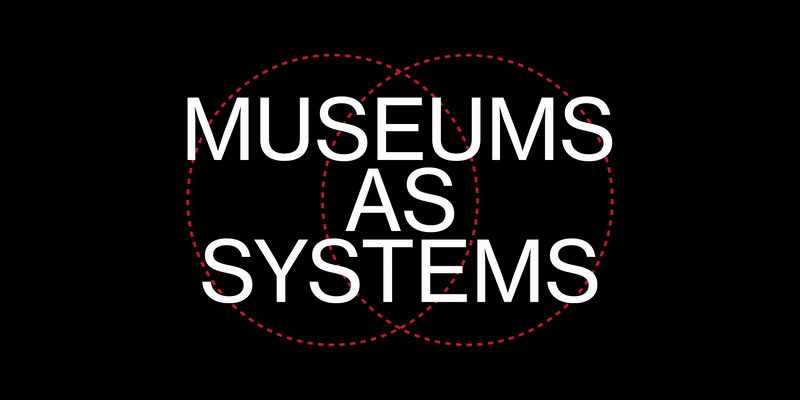Museums as Systems 2023
06.21.2023

Zoom
The two-day, annual Museums as Systems symposium gathers together arts workers to discuss alternative approaches to museum structures. The 2023 convening asks the question: what “resources" are necessary to reimagine the systems of museums?
This symposium explores “resources” through four key themes: love and care, creative fundraising, reclamation, and radical hospitality. Over four sessions, “Museums as Systems: Resources for Reimagination:” seeks to explore these concepts with the following questions: What do we have? What do we need? How do we get it? What are we willing to risk? to give up? What are the barriers to broadening access and how can we overcome them? What are alternative solutions to acquiring the resources we need?
This program is free and open to all. ASL interpretation and closed captioning will be provided.
Museums as Systems II day two sessions
Museums as Systems: Resources Day One
DEV 101: Thinking Outside the Bag
This panel aims to spotlight how, through creative ingenuity, development departments play integral roles in ensuring the survival of institutions, art, and artists, at every level.
Access and Accessibility as an Act(ion) of Radical Hospitality
This panel offers the perspectives and tactics of art workers and artists who are willing to go beyond tokenizing accessibility and who instead promote a rich, expansive form of equity.
Museums as Systems is generously funded by a grant from the Llewellyn Family Foundation. The Studio Museum in Harlem’s Learning and Engagement programs are supported by the Thompson Foundation Education Fund; William R. Kenan, Jr. Charitable Trust; Con Edison; Harlem Community Development Corporation; May and Samuel Rudin Family Foundation; and Joseph and Joan Cullman Foundation for the Arts. Additional support provided by the New York City Department of Cultural Affairs and New York State Council on the Arts.
Other Links
Museums as Systems 2023
06.21.2023

Zoom
The two-day, annual Museums as Systems symposium gathers together arts workers to discuss alternative approaches to museum structures. The 2023 convening asks the question: what “resources" are necessary to reimagine the systems of museums?
This symposium explores “resources” through four key themes: love and care, creative fundraising, reclamation, and radical hospitality. Over four sessions, “Museums as Systems: Resources for Reimagination:” seeks to explore these concepts with the following questions: What do we have? What do we need? How do we get it? What are we willing to risk? to give up? What are the barriers to broadening access and how can we overcome them? What are alternative solutions to acquiring the resources we need?
This program is free and open to all. ASL interpretation and closed captioning will be provided.
Museums as Systems II day two sessions
Museums as Systems: Resources Day One
DEV 101: Thinking Outside the Bag
This panel aims to spotlight how, through creative ingenuity, development departments play integral roles in ensuring the survival of institutions, art, and artists, at every level.
Access and Accessibility as an Act(ion) of Radical Hospitality
This panel offers the perspectives and tactics of art workers and artists who are willing to go beyond tokenizing accessibility and who instead promote a rich, expansive form of equity.
Museums as Systems is generously funded by a grant from the Llewellyn Family Foundation. The Studio Museum in Harlem’s Learning and Engagement programs are supported by the Thompson Foundation Education Fund; William R. Kenan, Jr. Charitable Trust; Con Edison; Harlem Community Development Corporation; May and Samuel Rudin Family Foundation; and Joseph and Joan Cullman Foundation for the Arts. Additional support provided by the New York City Department of Cultural Affairs and New York State Council on the Arts.
Zoom